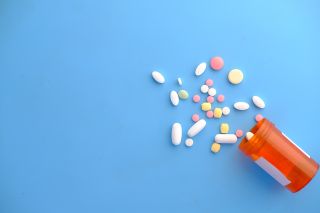Depression
Drugs for Depression: Answers to 6 FAQs
Anxious about antidepressants? Here's what you need to know.
Updated January 31, 2024 Reviewed by Michelle Quirk
Key points
- Social stigma, anxiety, and fear often lead to concerns and resistance about taking psychiatric drugs.
- Understanding why you are being prescribed medication and how long it will take to work alleviates anxiety.
- Becoming dependent and being a "zombie" are common worries that people have about antidepressants.

I was in my second year of medical school when Solomon Snyder, a professor of neuroscience at Johns Hopkins Medical School, presented to our class his revolutionary work in brain chemistry and molecular neuroscience. He and his team of graduate students had discovered receptors in the brain for an array of chemicals, neurotransmitters that have powerful psychological, biological, neurological, and behavioral effects. Some of them are actually produced endogenously (within us). Under a radiomicrograph, he identified the brain opioid receptors, which were the first receptors discovered. His work led the way for the discovery and understanding of neurotransmitters and psychoactive drugs—and to a transformation of the way we view depression and its treatment.
Dr. Snyder was the quintessential mad scientist. He came on stage with a laser pointer and, in seconds with no opening patter, was off and running, presenting his slides. He was a man on a mission. At one point, stepping back to see a slide, he edged too far away and fell off the stage. Students in the first row rushed to help him, but he had jumped up by the time they could reach him—almost like this was a natural occurrence for him. There was no segue or funny comment. He simply stood up, hopped back on stage, and continued his talk.
Shortly after, Dr. Snyder went on to win the prestigious Lasker Award for his work on the opioid receptor. Neurochemists, neuropsychopharmacologists, neuroendocrinologists, neuropsychologists, and evolutionary psychologists have gone on to study the multiple versions of the opioid receptor and how they can each affect behavior.
A new era was upon us. The number of psychiatric medications introduced since I started my career in psychiatry has skyrocketed. Many people take for granted or downplay how remarkable it is that we now have a wide array of drugs with which to address depression. And while there is a lack of definitive understanding about how these medications work, there is no doubt that they have significantly expanded the ability of psychiatrists to treat major depression.
Psychotherapy, mind–body practices, and wellness habits can all play an important role in helping someone make a full recovery from depression. But, when someone is suffering from major depression, it is often only when the biological component of the condition s addressed that an individual can take advantage of therapy or pursue a regular practice of meditation, yoga, or any form of exercise to boost their mood.
It’s quite common for individuals who are depressed to express concern about taking antidepressants or other psychiatric drugs. Here are some of the most common questions patients ask and how I respond.
Q: I don’t think antidepressants are going to help me. Why do you think I should take them?
A. The nature of depression is to be depressed, anxious, and negative, so it's natural that you are worried about taking medication. Your pessimism is your depression talking. For patients who feel anxious about taking an antidepressant, I sometimes suggest that they initially take a very small dose of antianxiety medication so that they stay calm until the antidepressant “kicks in.” I also believe in starting all psychiatric medications at a very low dose and slowly increasing them until they reach a therapeutic level. This helps the body adjust to the medication so gradually that it prevents side effects from cropping up.
Q: Why are you prescribing this particular medication?
A: You've probably heard the names of antidepressants tossed around—Prozac, Zoloft, Celexa, Wellbutrin—and assumed that it's pretty random as to which one a psychiatrist prescribes. It's not. Depression can manifest in a variety of ways. Treating depression is symptom-specific. The goal is to select an antidepressant that will have the best therapeutic effect on your specific symptoms with the least number of or, ideally, no side effects. We have six categories of psychotropic medications that can target individual symptoms related to mood (anxiety, irritability), cognition (focusing on negatives, inability to focus on positives, lack of concentration, difficulty making decisions), poor memory, poor sleep, and appetite problems. We can mix and match different medications so that we can address the specific problems that are bothering you.
Q. How long will it take for the medication to work?
A. It can take up to 3+ months for psychiatric drugs to fully take effect. There are, however, small and encouraging signs early on that indicate the medication is beginning to take effect.
Q. If I start medication, will I have to be on it forever?
A. No. The first step is to figure out what is the best treatment for you now. If you agree to it, it can take a few weeks to months to get your life back on track. After you've enjoyed recovery for some time, perhaps a year, we can consider the reasons why you might stay on the medication, cut back a bit, or cut it out completely.
Q. Am I going to become dependent on the medication?
A. You won't be dependent on psychiatric medications the way people can become dependent on pain medication. But, when you take the appropriate medications, they will work, and if you stop using them precipitously, the symptoms of the condition could return. That's not because of your dependency on the medication but rather the lengthy course of the condition and that the medications may continue to afford you benefit for an extended period of time. But we’ll test the waters at a certain point to see if you actually still need them. Basically, we can treat this condition very well, but we will continue to need to track it.
Q: I am afraid I will become a zombie. Will I lose the ability to feel things?
A. No. You will actually become a better version of yourself and be able to feel positive things that you haven't felt for a long time. The medications that we call "antidepressants" are actually inert. They don't do anything, so to speak, in their own right. They affect the brain's neurochemical levels so that they return to a normal level. In other words, they cause "normalcy" or better to return. Right now, depression is preventing you from being your full self. In some ways, your emotions are deadened now. Medication will relieve that despairing state and help you be the real you.
Unfortunately, there is a lot of negative publicity about antidepressants that is misleading and potentially harmful. Be sure to voice any concerns you have about the psychiatric medication being prescribed with your doctor and be prepared for your psychiatric consultation so you are clear about your diagnosis and treatment plan. A comprehensive consultation is the key to identifying your condition and getting good treatment. Being depressed can be a devastating experience, but there is every reason to be hopeful that your depression can be treated.
Many times individuals who are successfully treated for depression don’t just become un-depressed, they become the most fully actualized people they have ever been. Once the biological factors are dealt with, they can tackle their life challenges in a can-do constructive way. I've seen many patients enjoy what seems to be an energy boost, finally being able to take action and practice healthy habits and build positive relationships. While medication in itself is not a quick fix, it can provide the emotional regulation and stability necessary to allow individuals to integrate psychotherapeutic modalities and wellness habits into their daily lives and enjoy a full recovery from depression.




